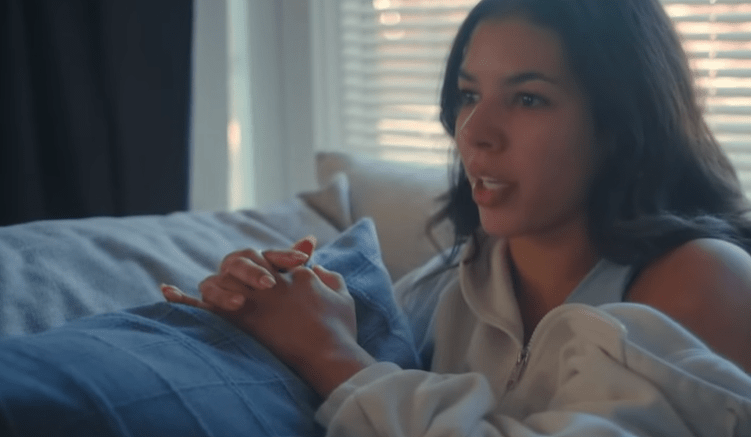Chandi Dayle – Personal and Professional Overview
| Attribute | Detail |
|---|---|
| Full Name | Chandi Dayle |
| Age | 26 |
| Profession | Former Dallas Cowboys Cheerleader, Social Media Manager |
| DCC Tenure | 6 Seasons |
| Relationship History | Previously dated Ryan; now dating an unnamed new partner |
| Public Incident | Broke team rules during Bahamas trip amid emotional stress |
| Notable Role | Co-point leader in “Thunderstruck” routine |
| Current Focus | Hip surgery recovery and personal healing |
| Status as of 2025 | Retired from DCC, building life outside of team |
| Verified Source | Feast Magazine – Chandi’s Boyfriend Drama |

Originally a subplot on America’s Sweethearts: Dallas Cowboys Cheerleaders, Chandi Dayle’s relationship with her ex-boyfriend Ryan quickly developed into something much more intricate and emotionally illuminating. At first glance, viewers saw Ryan as a helpful person, but underneath that façade, Chandi was silently dealing with something much more serious. Their relationship turned into a vicious cycle of manipulation, control, and emotional strain that had a big impact on her both personally and professionally, as she later revealed both on and off screen.
When Chandi started a new relationship, it was a turning point. It ought to have been a positive step in the direction of emotional healing. Rather, her ex reacted in a frightening way, allegedly harassing Chandi and sending threatening messages from several fictitious numbers, making her feel unsafe and watched. The emotional toll of that experience was especially evident during the DCC’s widely reported Bahamas trip. Chandi’s carefully manicured smiles and carefully chosen social media posts belied her internal disintegration.
By bringing a stranger into her hotel room, she violated a crucial team rule, which caused the cheerleaders to become internally alarmed. This was not an act of defiance or rebellion. Chandi subsequently clarified that it was a last-ditch effort to establish an emotional bond following months of feeling shattered and alone. According to reports, her new partner had been a quiet source of support when she was feeling particularly vulnerable and emotionally dislocated. Even though it was a risky choice, it was a kind of release.
When it comes to safety, the DCC code of conduct is very explicit. Later, KayDianna, a teammate, brought up the fact that their contracts explicitly prohibit inviting outsiders or sharing hotel information. Even though following those guidelines is crucial, Chandi’s situation exposed a vulnerability that is rarely seen in accounts of athletic performances. The aftermath of an emotionally taxing breakup influenced her decision, even though it was a breach. She couldn’t just compartmentalize the layers of pain, confusion, and fear she carried for the sake of appearances.
What transpired was strikingly instructive. Chandi did not refute or deflect. She acknowledged her error, resigned from her position as co-leader, and rejoined the team with quiet fortitude rather than authority. In an environment that thrives on uniformity and structure, it was a remarkably mature response. She decided to accept the consequences and move on instead of fabricating the story or placing the blame elsewhere.
She declared her retirement at the conclusion of the season. During that farewell, her voice cracked with relief and gratitude. Although she expressed gratitude to Judy Trammell and Kelli Finglass for their advice, her most moving remarks were introspective. She said, “I feel fine,” a seemingly straightforward statement that conveyed a lot about a woman finding strength again via candor.
Online rumors about her new boyfriend have only gotten more intense. His appearance, intentions, and presence were discussed in Reddit threads and fan forums. Some viewers were supportive, especially inspired by Chandi’s openness, while others voiced cautious concern. The way public women, particularly those who have survived toxic relationships, are frequently scrutinized is remarkably similar to this conflicted response. They receive praise for their ability to heal, but they are criticized for their future decisions.
The tale of Chandi has grown to be a powerful illustration of individual agency. Her choice to talk publicly about her experience with harassment, emotional distress, and her recovery process reflects a growing trend in how performers and celebrities deal with trauma. In a similar vein, public personalities such as singer Demi Lovato and gymnast Aly Raisman have taken charge of their stories, igniting discussions about self-worth, privacy, and mental health. Now, whether on purpose or not, Chandi becomes a part of that group by speaking her truth with remarkable clarity.
She has significantly improved how others view vulnerability in competitive settings by prioritizing honesty over performance. Her silent departure from the limelight has gained the same impact as any cheerleading act. It suggests that choosing to sit out, think, and rebuild is sometimes a more powerful option than taking the stage.
Through her experience, Chandi has demonstrated how to handle emotionally taxing situations in a very effective way. Her openness has brought attention to a form of suffering that is frequently hidden. Her story has changed the way that balance is perceived, especially in sports where mental stress is rarely recognized and endurance is physicalized.
Her next chapter may feel less public in the years to come, but it will probably be more impactful. Now that she has shed her DCC identity, she can write her own story without being constrained by predetermined plots, studio lighting, or emotionally taxing performances. Even though the spotlight has waned, she can now write the story.

